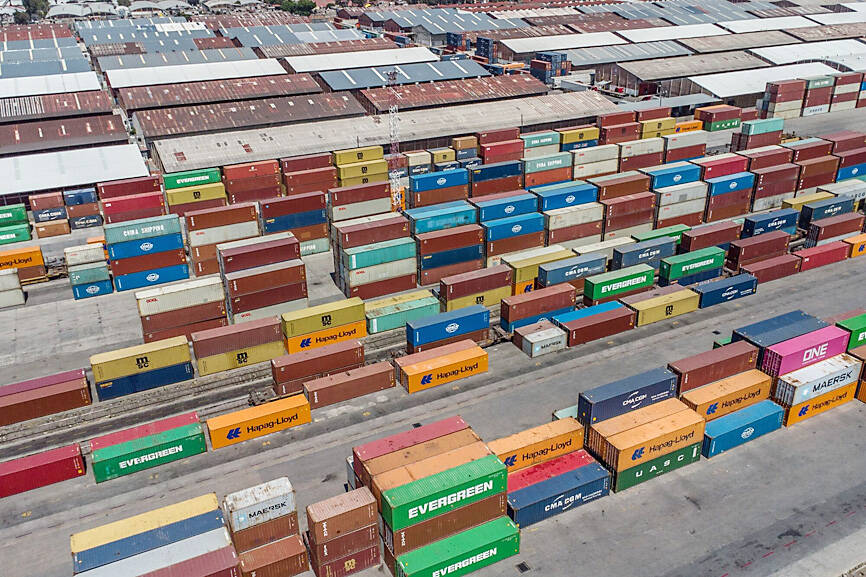Taiwanese companies should hold off on major strategic moves in Mexico, a key destination for Taiwanese overseas investment, until the US finalizes its new tariff policies, academics said yesterday, amid uncertainty surrounding proposed duties announced by US President Donald Trump.
Trump on Saturday threatened to impose a 30 percent tariff on goods from Mexico starting on Aug. 1 unless new trade agreements are reached.
Dachrahn Wu (吳大任), director of National Central University’s Research Center for Taiwan Economic Development, said that while Trump has a history of announcing high tariffs to pressure countries into making concessions, the proposed rates have not yet been finalized, leaving room for negotiation.

Photo: Bloomberg
“Taiwanese firms should not act hastily, as land purchases and factory construction involve major capital expenditures,” Wu said. “Premature moves could trigger capital flight and steep losses in asset values.”
He recommended that firms wait until after Aug. 1 — when the US trade outlook is expected to become clearer — before adjusting their overseas investment strategies.
More than 300 Taiwanese companies have set up manufacturing operations in Mexico over the past few years, drawn by its proximity to the US and the global trend toward nearshoring.
Wu said that if the proposed tariffs are implemented, Taiwanese companies operating in Mexico would face higher production costs and weakened competitiveness.
However, even if a 25 or 30 percent tariff is eventually applied to Taiwan directly, there might still be opportunities to negotiate for a reduced rate, he added.
Darson Chiu (邱達生), an economist at Tunghai University, said that while countries have received tariff notices from Trump, the rates are not final and remain subject to negotiation.
Nevertheless, Chiu said that the uncertainty introduced by Trump’s announcement has added complexity to Taiwan’s trade position.
Despite Taiwan Semiconductor Manufacturing Co (TSMC, 台積電) committing to invest an additional US$100 billion in the US and produce advanced chips there, Trump’s trade strategy prioritizes countries that “fully accept” his terms during trade negotiations.
Chiu cited Japan as an example, which has sent representatives to Washington seven times since April, but due to Japan’s firm position on sensitive sectors such as cars and rice, the US raised the proposed tariff on Japanese imports to 25 percent — 1 percent higher than the rate discussed in April.
Regarding Taiwan, Chiu said that President William Lai (賴清德) and the Executive Yuan have recently reiterated their commitment to protecting public health in trade talks with the US.
This might signal continued resistance to easing restrictions on imports of US pork and beef, he said.
However, if the US threatens to impose high tariffs on Taiwan, there is no need for immediate concern, as negotiations would still be possible, he added.
He also said that the Aug. 1 implementation date for Trump’s proposed tariffs might not necessarily be fixed.
Total cumulative Taiwanese investment in Mexico has reached about US$3 billion, supporting more than 50,000 jobs, Ministry of Economic Affairs data showed.

SETBACK: Apple’s India iPhone push has been disrupted after Foxconn recalled hundreds of Chinese engineers, amid Beijing’s attempts to curb tech transfers Apple Inc assembly partner Hon Hai Precision Industry Co (鴻海精密), also known internationally as Foxconn Technology Group (富士康科技集團), has recalled about 300 Chinese engineers from a factory in India, the latest setback for the iPhone maker’s push to rapidly expand in the country. The extraction of Chinese workers from the factory of Yuzhan Technology (India) Private Ltd, a Hon Hai component unit, in southern Tamil Nadu state, is the second such move in a few months. The company has started flying in Taiwanese engineers to replace staff leaving, people familiar with the matter said, asking not to be named, as the

The prices of gasoline and diesel at domestic fuel stations are to rise NT$0.1 and NT$0.4 per liter this week respectively, after international crude oil prices rose last week, CPC Corp, Taiwan (台灣中油) and Formosa Petrochemical Corp (台塑石化) announced yesterday. Effective today, gasoline prices at CPC and Formosa stations are to rise to NT$27.3, NT$28.8 and NT$30.8 per liter for 92, 95 and 98-octane unleaded gasoline respectively, the companies said in separate statements. The price of premium diesel is to rise to NT$26.2 per liter at CPC stations and NT$26 at Formosa pumps, they said. The announcements came after international crude oil prices

SinoPac Financial Holdings Co (永豐金控) is weighing whether to add a life insurance business to its portfolio, but would tread cautiously after completing three acquisitions in quick succession, president Stanley Chu (朱士廷) said yesterday. “We are carefully considering whether life insurance should play a role in SinoPac’s business map,” Chu told reporters ahead of an earnings conference. “Our priority is to ensure the success of the deals we have already made, even though we are tracking some possible targets.” Local media have reported that Mercuries Life Insurance Co (三商美邦人壽), which is seeking buyers amid financial strains, has invited three financial

CAUTION: Right now, artificial intelligence runs on faith, not productivity and eventually, the risk of a bubble will emerge,’ TIER economist Gordon Sun said Taiwanese manufacturers turned more optimistic last month, ending a five-month streak of declining sentiment as concerns over US tariffs, currency volatility and China’s overcapacity began to ease, the Taiwan Institute of Economic Research (TIER) said yesterday. The manufacturing business confidence index rose 1.17 points from June to 86.8, its first rebound since February. TIER economist Gordon Sun (孫明德) attributed the uptick to fading trade uncertainties, a steadier New Taiwan dollar and reduced competitive pressure from Chinese producers. Taiwan’s semiconductor industry is unlikely to face significant damage from Washington’s ongoing probe into semiconductors, given the US’ reliance on Taiwanese chips to power artificial